The Success Principles(TM) - 10th Anniversary Edition: How to Get from Where You Are to Where You Want to Be
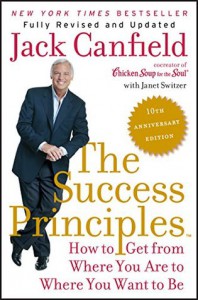 The 10th Anniversary edition of “The Success Principles” is a refreshed, updated, version of the original “Success Principles” book that will benefit readers of the original version and new readers alike. The stories and examples of people who have struggled and realized success are more contemporary, allowing this new generation of readers to better relate to the names and stories that are shared, the facts and figures have been updated, some of the sections have been renamed and there are entirely new sections at the end of the book. These new sections are: “Brand Yourself with an Online Persona,” “Use Social Media in a Way that Enhance Your Reputation,” “Use the Exponential Power of Crowdfunding,” “Connect with People Who Can Expand Your Vision.”
The 10th Anniversary edition of “The Success Principles” is a refreshed, updated, version of the original “Success Principles” book that will benefit readers of the original version and new readers alike. The stories and examples of people who have struggled and realized success are more contemporary, allowing this new generation of readers to better relate to the names and stories that are shared, the facts and figures have been updated, some of the sections have been renamed and there are entirely new sections at the end of the book. These new sections are: “Brand Yourself with an Online Persona,” “Use Social Media in a Way that Enhance Your Reputation,” “Use the Exponential Power of Crowdfunding,” “Connect with People Who Can Expand Your Vision.”In all, the sections now number 67 and the page count has increased from 473 to a whopping 587. While the page count seems formidable and daunting, readers should remember that Jack and Janet did not acquire or perfect the skills in this book overnight and that the information provides the basis for life-long learning. For instance, removing ourselves from an environment where we are surrounded by negative people and influences will likely be an adaptation that we will make over an extended period of time and will always face, unless of course we are on a desert island with a volleyball.
Additionally, managing expectations, dealing with feedback, creating a wealth consciousness, speaking with impeccability, practicing gratitude and a host of other ideas will be lifelong endeavors.
Granted, some of the suggestions like, “Pay yourself first” or “Hire a coach” can be performed immediately; however, regardless of the task, one of the crucial points to remember is that although the suggestions/ideas in “The Success Principles” will benefit everyone, each person will need to customize the ideas to their own situation. To that end, one of the exercises at the beginning of the book involves determining your unique purpose in life and also the answer to an all-important question, “What does success mean to you?”
Just as the answers to the crucial questions will be unique for every reader, the journey through this book will also be unique and I found some sections zoomed past like a speed boat and in other sections I felt like I was paddling a canoe. Some of the information was self-evident, other information provided some wonderful “A-ha” moments; certain ideas have sunk in, and other ideas will need to be revisited numerous times. And, thankfully, Jack Canfield and Janet Switzer have provided a massive resource that will give me easy access to some of the information that I need and, in the end, makes the road to success more accessible to everyone.
Success is an evolving, lifelong experience and if you want to improve the quality of your life, whether on a personal level, with a loved one, or in business, there are bound to be words of wisdom and tools in “The 10th Anniversary edition of The Success Principles” to help you build a better way.
Your Greatest Power
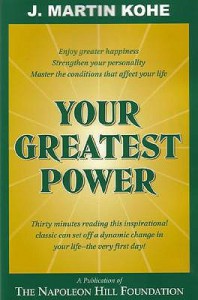 While I prefer a larger sized font over the prescription-label-sized-fonts that some books use, and while I appreciate concise discussions more than rambling, verbose texts, this book, “Your Greatest Power,” has barely “enough” to make it onto my “good” list.
While I prefer a larger sized font over the prescription-label-sized-fonts that some books use, and while I appreciate concise discussions more than rambling, verbose texts, this book, “Your Greatest Power,” has barely “enough” to make it onto my “good” list. Granted, the cover of the book does say, “Thirty minutes reading this inspirational classic….”, so it should come as no surprise that there is not a whole lot of physical ink on the pages; however, calling this book an “Inspirational Classic” is a stretch as far as I’m concerned. Yes, the message it contains is worth reading, worth repeating, and worth applying in your life, so all is not lost; however, at a cost of $12.95 I am inclined to say that people would get more value from many of the other superb books that the Napoleon Hill Foundation offers or from many of the other highly rated, self-help/personal transformation books in this genre.
What message does this book contain that still makes the material worth reading? The message is that we always have the power to choose and it is the choices we make that will determine our degree of happiness and success in life. Basically, the book provides some stories and some insights into the fact that NO MATTER WHAT happens to us outside, we control what happens inside. There is really no discussion on how to control what happens inside; the premise is simply that choice is the key to our life. Choose to be happy, choose to be kind, choose to be grateful etc.
And, after having read this review, you can choose to buy another book, or not.
Enough Already: The Power of Radical Contentment
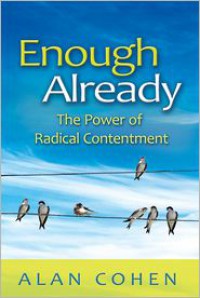 Rather than re-invent the wheel, or in this case the book summary, I will defer to the author, Alan Cohen, to give an explanation of what the book is about. The theme of “Enough Already” is, “You can have enough because you are enough, you deserve enough, and enough is always available constitutes the core lesson, and every sentence and chapter illuminates the central principle from a unique angle. “
Rather than re-invent the wheel, or in this case the book summary, I will defer to the author, Alan Cohen, to give an explanation of what the book is about. The theme of “Enough Already” is, “You can have enough because you are enough, you deserve enough, and enough is always available constitutes the core lesson, and every sentence and chapter illuminates the central principle from a unique angle. “The End….
Just kidding. While above summary is completely succinct and accurate, there is a great deal more about “Enough Already” that I want to share because it contains an abundance of compassionate, self-empowering wisdom. Using personal accounts, quotes from both well- known and less-familiar people throughout history and just pure insight into life itself, Alan Cohen reminds us that while we are seeking externally for our bliss we always have the opportunity to find it within.
During this discussion the author shares: his formula for manifestation, how obstacles are actually for our benefit, how we need to create an idea in the inner world BEFORE it can manifest in the outer world, that suffering is a result of fighting against life, the destructive nature of guilt and negative emotions, and so much more.
Actually, just as I deferred to the author for the book summary in the first paragraph of the review, I believe that it is far more transformative to defer to Alan Cohen’s direct quotes that it is for me to simply give a summary of the information. This is a very small sampling of the comments/thoughts that I found to be extremely profound:
“Knowledge helps you navigate the earth, but wisdom helps you navigate the landscape of your soul. Knowing how to get from Tucson to Los Angeles is important, but knowing how to move from fear to love is more important.”
“Most technical questions can be answered within seconds by doing an Internet search. We were more crucial need is to access the Innernet–the vast reservoir of truth embedded in your deep subconscious (or superconscious) mind.”
“We all have possessions, and we want to keep them. The question is: Do you own your possessions, or do they own you?”
“We reward knowledge, but overlook wisdom.”
“There is no argument between science and spirit, except in minds that do not grasp the magnitude of both.”
And these examples are found in just the first 30 pages!
As you can see, like the physical arrangement of the book, which is, “…organized holographically, meaning that every chapter and section relates to the theme like spokes radiating the center of a wheel, rather than on domino falling after another. All truths are connected to each other, like facets of a diamond” we will find that any quest of self-exploration ultimately leads back to oneself. In other words, and so eloquently stated by George Moore, and quoted by Alan Cohen, “A man travels the world over in search of what he needs and returns home to find it.”
The Power of Compassion: A Collection of Lectures by His Holiness the XIV Dalai Lama
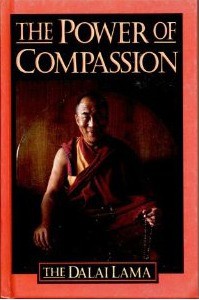 While not found on the cover, the subtitle of “The Power of Compassion” is, “A Collection of Lectures by His Holiness The XIV Dalai Lama” and this adds some clarity to the content of the book because the book is not exclusively related to the subject of compassion. While the Dalai Lama exudes compassion throughout “The Power of Compassion” and, while compassion may be the thread that connects the discussions in this book, there are essentially six main topics (broken into distinct chapters) that this book focuses on:
While not found on the cover, the subtitle of “The Power of Compassion” is, “A Collection of Lectures by His Holiness The XIV Dalai Lama” and this adds some clarity to the content of the book because the book is not exclusively related to the subject of compassion. While the Dalai Lama exudes compassion throughout “The Power of Compassion” and, while compassion may be the thread that connects the discussions in this book, there are essentially six main topics (broken into distinct chapters) that this book focuses on:1) Contentment, Joy and Living Well
2) Facing Death and Dying Well
3) Dealing with Anger and Emotion
4) Giving and Receiving: A Practical Way of Directing Love and Compassion
5) Interdependence, Inter-connectedness and the nature of Reality
6) The Challenge for Humanity: An Interfaith Address
and there is a seventh chapter that presents a series of questions and answers.
Of course, these discussions come from a Buddhist perspective; however, the Dalai Lama also seems to use a great deal of common sense when exploring these ideas. Indeed, the Dalai Lama even says that, “…in Buddhism, greater emphasis is given to reason and intelligence than faith.” Having very little knowledge of the Buddhist philosophy, this came as a surprise to me.
Another aspect of Buddhism that I found surprising was how it seems to evolve and incorporate new ideas as society changes,
“I think it is quite important to be able to make a distinction between what I call the ‘core’ and ‘essence’ of religious teachings and the cultural aspects of the particular tradition. What I would call the ‘essence’ or ‘core’ of religious traditions are the basic religious messages, such as the principles of love, compassion and so forth, which always retain the relevance and importance, irrespective of time and circumstances. But as time changes, the cultural context changes, and I think it is important for the followers of religious traditions to be able to make the necessary changes that would reflect the particular concerns of their time and culture.”
Furthermore, the discussion around ‘Interdependence, Inter-Connectedness, and the Nature of Reality’ might very much read like a section straight out of a modern textbook in physics rather than Scriptures from hundreds of years ago.
While this aforementioned, fifth chapter of the book provided for a challenging read, I also find that my layman’s knowledge of Buddhism was a hindrance when trying to grasp the many precepts that entered into the discussion. Principles such as: the Four Noble Truths, the Four Powers, the Three Jewels, the Ten Negative Actions etc. are all absolutely foreign to me. I assume, even though I prefer not to make assumptions, that readers who are better versed on Buddhist traditions and texts would derive far more benefit from these specific discussions that I was able to.
In general though, I would say that, in spite of my limited knowledge, I felt that there were some profound insights in “The Power of Compassion” and my life will be improved from having read them.
Stop Your Sh*t Shoveling: Why Your Life Is in the Toilet and What You Can Do about It
 This book, “Stop Your Sh*t Shoveling” is perfect proof that you don’t need hundreds of pages of dialogue to make a book useful.At 48 pages in length, Carl Hammerschlag, a world renown psychiatrist and healer, makes his points quickly, directly and, as you have likely guessed from the title of the book, without candy-coating. That being said, Carl also uses substantial does of humor to hammer home his point (pun intended).
This book, “Stop Your Sh*t Shoveling” is perfect proof that you don’t need hundreds of pages of dialogue to make a book useful.At 48 pages in length, Carl Hammerschlag, a world renown psychiatrist and healer, makes his points quickly, directly and, as you have likely guessed from the title of the book, without candy-coating. That being said, Carl also uses substantial does of humor to hammer home his point (pun intended). For those that might not be familiar with sh*t shovelers, Carl categorizes them into two levels, with level 1 being, “…the people who occasionally spend time complaining about people/situations/behaviours that give them pain and heartache but always manage to put up with it.” Those on level two are those “people who are getting a PhD (Piled Higher and Deeper) in shoveling. They’re the folks you know who endlessly tell you, year after year, about their crummy marriage, traumatic childhood, or the tragedy that happened ten years ago, maybe twenty….Chronic Shit Shovelers continue to spread it around, toss it back and forth, but never do the transformational work required to create lasting change in their lives.”
Of course it is ironic that we can usually recognize the shovelers around us, yet, like vampires, a mirror has a tendency to make them vanish. Therefore, if you are having a hard time recognizing a sh*t shoveler, Carl provides a quick and easy 7-point, self-examination to help you determine how big your shovel is.
Of course it isn’t all gloomy, and there is hope for those who are truly tired of shoveling. If you have arrived at a point in life when you realize that the best way to get out of the hole is to stop shoveling then are some ideas that will help you and then you realize that, “If there is no enemy within, the enemy outside can do you no harm.”
The overall message behind this book is that while we all have challenges in our lives, they are compounded by us holding onto them and dealing with these issues doesn’t have to be a long, complicated process. As Carl so aptly says, it is about, “putting down the shovels and moving away from the piles.” So, if you’re up to your neck in some stinky stuff and it is piling up faster than you can shovel it, maybe it’s not years of therapy you need, but rather a 48 page book written by Carl Hammerschlag.
Notes to the Future: The Authorized Book of Selected Quotations
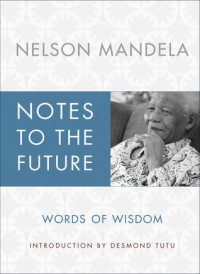 Just think, not too long ago it was illegal to quote him, this review could have landed me in jail....
Just think, not too long ago it was illegal to quote him, this review could have landed me in jail....This book, “Notes to the Future” is an authoritative collection of Nelson Mandela’s ‘most inspiring and historically important quotations.’ The reader is provided with wisdom and insights derived from Nelson Mandela’s public speeches, interviews and even his personal letters to friends and family. The quotes are dated from the time before his incarceration, up until the start of the new millennium, and they are arranged into four central themes: “Struggle”; “Victory”; “Wisdom”; “Future”; with these themes then being broken down into categories/sub-themes - generally consisting of between two and seven quotes.
While it would impractical to list all of the profound insights that the reader will find in “Notes to the Future”, a few of them are:
“ Our differences are our strength as a species and as a world community.”
“We should never forget those on whose shoulders we stand and those who paid the supreme price for freedom.”
“It is in the character of growth that we should learn from both pleasant and unpleasant experiences.”
“It is what we make out of what we have, not what we are given, that separates one person from another.”
“No single person, no body of opinion, no political doctrine, no religious doctrine can claim a monopoly on truth.”
In addition to these specific quotes, “Notes to the Future” contains another 300+ quotes, all dated and sourced.
The final few pages of the book are dedicated to Nelson Mandela’s Nobel Peace Prize acceptance speech in 1993 and, just so that the reader is aware, Nelson Mandela’s biographical information is limited to the information gleaned from the quotes themselves and the brief introduction by Desmond Tutu.
Safari to the Soul
 Having worked with NASA, Fortune 500 CEOs and Olympic athletes, and having written numerous best-selling books on personal achievement, such as “The Psychology of Winning” and “Seeds of Greatness”, it might come as a surprise to some that Denis authored a book titled “Safari to the Soul” as well. “Safari to the Soul” was written long after his initial books on success and I see this book as a culmination, an evolution, of the wisdom Denis gained from those years in the arena of personal development now being expanded to encompass more of a universal, dare I say “spiritual” context. As such, “Safari to the Soul” might well be the most profound book he has written thus far.
Having worked with NASA, Fortune 500 CEOs and Olympic athletes, and having written numerous best-selling books on personal achievement, such as “The Psychology of Winning” and “Seeds of Greatness”, it might come as a surprise to some that Denis authored a book titled “Safari to the Soul” as well. “Safari to the Soul” was written long after his initial books on success and I see this book as a culmination, an evolution, of the wisdom Denis gained from those years in the arena of personal development now being expanded to encompass more of a universal, dare I say “spiritual” context. As such, “Safari to the Soul” might well be the most profound book he has written thus far.“Safari to the Soul” was derived from Dennis Waitley’s personal experience while on safari in the Masai Mara in Kenya and he shares his adventure using a combination of journal entries and introspective dialogue. More than just a travel log, Denis takes his experiences from the safari and he interweaves them with the profound realizations that came to him during, and after, his time in Africa.
The interconnectedness between the Masai people, the animals and their environment and how each one has a role to play in assuring mutual survival is not a concept limited to the wilds of Africa, but rather a concept that applies to everyone on this planet regardless where we live. Seeing this symbiotic relationship and being able to absorb the information in an environment free from all the sensory stimuli that pervades Western Society, Denis came to some personal realizations that can apply to all of humanity. Some of the insights that Denis shares are:
“With each species of wildlife that becomes extinct, a part of us dies as well. In West Africa, the elephants of Timbuktu are the only large mammals remaining in the region. What we do to the web, we do to ourselves.”
“Most of us are trying to be cheetahs. We charge through our lives as if life were a race finish first.”
“…while there are dangers in trying to become a leader without thoroughly knowing your field, there also dangers in thinking of yourself as an expert–especially the danger losing your sense of wonder. Instead of being driven by curiosity, you become driven to defend what you’ve previously researched, invented, created, marketed or published. Reciting safe answers now, you stop saying the liberating words, ‘I don’t know.’”
“Serenity is achieved when you learn to convert failure into fertilizer, stumbling blocks into stepping stones, and misfortunes into learning experiences.”
While some of the aforementioned insights might already be familiar to those readers who are interested in the Spiritual/New Age genre, when they are combined with Denis’ personal experience, they make for an engaging read. With a high level of personal disclosure Denis reminds us that personal achievement/success is not a term that can be universally applied and it evolves into different forms as we ourselves evolve.
One final note - the book opens up with a substantial amount of detail about the people who run the safari company and their history, and, while it will be useful for those wanting to go there at some point in the future, me being one of them, some people might find it too lengthy.
Co-creating at Its Best: A Conversation Between Master Teachers
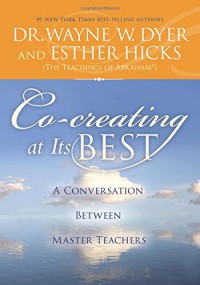 **I just want to say up front that when doing a review for a book that is essentially written by 2 people I found it difficult to give a rating for the entire work when the contributions were significantly different. In this case the 4 star rating for the entire book is an average of the two authors contributions (I would give Esther a 5 based on her contribution.)**
**I just want to say up front that when doing a review for a book that is essentially written by 2 people I found it difficult to give a rating for the entire work when the contributions were significantly different. In this case the 4 star rating for the entire book is an average of the two authors contributions (I would give Esther a 5 based on her contribution.)**This book, “Co-creating at its Best”, is derived from a live presentation/discussion between Wayne Dyer and Esther Hicks (channeling Abraham). For those that are unfamiliar with Abraham, it is a name given to a group on non-physical entities that Esther Hicks communicates with in order to bring more awareness to humanity and while this book gives a brief introduction to Abraham, this book does not extensively present background information on either Esther or Abraham.
Now, I realize that there is a great deal of apprehension when the term ‘channeling’ is used and this review is not intended to debate, for or against, the concept of gathering information from a non-physical source, I am only sharing my views as it relates to the information in this book.
The information itself is presented in a simple question-answer format with Wayne Dyer asking the questions and Esther/Abraham providing the answers. This easy to read format, combined with the fact that book is physically small and approximately 160 pages in length, makes for a leisurely read. The structure of the book also enables the reader to skip segments/questions that don’t interest them and yet still be able to follow the general flow of the discussion.
Some of the specific questions and topics covered in the discussion include: what is inspiration, can a few people influence the many, dealing with bad news, past regrets, dharma, overcoming obstacles and, for me, the 2 most important concepts; the power of ‘thought momentum’ (essentially the idea that, as we continue on a particular train of thought those thoughts become more powerful and have a greater impact on our lives and it is far easier to change our situation if we become aware of the negative thoughts before they get going too quickly) and the idea that, “ …the Universe doesn’t hear what you say; the Universe hears how you feel.” This is to say that hollow words don’t have anywhere near the power to create that our emotions have.
Not being overly familiar Esther/Abraham I can’t say if fans of their material will be happy or not, I personally liked her part of the dialogue and I feel that I benefited from the information. On the other hand, being more familiar with Wayne Dyer’s work and generally a fan of his writing, I can’t say that his part of the dialogue was his best work. Although I have no way of knowing what the directive was for how the questions were supposed to be phrased, I would have preferred questions that didn’t include so much of his personal journey.
Unlikely Heroes: 42 Stories of Courage and Compassion from the Animal Kingdom
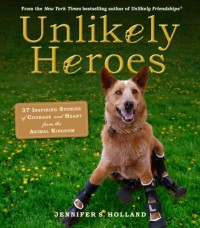 If you’re an animal lover or just enjoy hearing stories to warm your heart, you can’t get a book more appropriate than Jennifer Holland’s latest book, ‘Unlikely Heroes: 37 Inspiring Stories of Courage and Heart from the Animal Kingdom.’ Her other books, are also amazing, but when you combine awesome animals with heroic stories, how can you not be ‘wow-ed’?
If you’re an animal lover or just enjoy hearing stories to warm your heart, you can’t get a book more appropriate than Jennifer Holland’s latest book, ‘Unlikely Heroes: 37 Inspiring Stories of Courage and Heart from the Animal Kingdom.’ Her other books, are also amazing, but when you combine awesome animals with heroic stories, how can you not be ‘wow-ed’?Along with the dog stories that you might expect, there are many other animals; like a bunny working in a hospital, a Gorilla helping an injured child, hero horses, cows and even mine sniffing rats, all get some well-deserved recognition in this book. Regardless of which animal the story revolves around, all of these encounters are life-affirming and remind us that compassion can transcend all logic and physical bounds.
The other wonderful thing about this book, and the other books by this author, is that the stories can be read numerous times and they never lose their impact. This is one of those books that will get you through a day of “Blahs”, and, for less than $14, this book makes an inexpensive gift that will lift the spirits of anyone who receives it.
The Future of God: A Practical Approach to Spirituality for Our Times
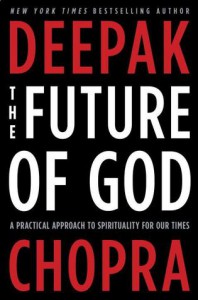 No delusions, just an open mind.
No delusions, just an open mind.The main reason I like Deepak Chopra’s latest book, “The Future of God” is that it stands as a viable alternative to the “militant atheist’s” bible, “the God delusion.” Indeed, even though Deepak does not make the statement himself (at least I have not read specific words to that effect), it seems to me that “The Future of God” was written as a direct response to the “avowed enemies of faith.” As such, many references are made to the militant atheist tribe and their self-proclaimed conquistadors.
Deepak does clearly state in this book that he has no issue with those who have no faith in a higher power, he simply takes exception to the fact that, ‘This disturbing movement centered around Professor Richard Dawkins cloaks its vehement, often personal attacks in terms of science and rea-son… I have no harsh things to say about atheism without the militancy.’
Building from there, Deepak incorporates three stages of personal development that one progresses through on the path to God: unbelief, faith and finally knowledge. In other words, “They are stepping-stones from ‘No God’ to ‘Perhaps God’ to ‘God in me.’” The first stage of ‘Unbelief’ is characterized by reason and doubt and individuals, atheists, take the position that the physical is all that there is. The second stage, ‘Faith’, is when individuals hope that God is real and while this can be a positive influence, there is also the negative side of faith which is fanaticism. The third and final stage, ‘Knowledge’, is the stage where we are able to assert unquestioningly to ourselves that God does exist. The transition from stage to stage is not a clear cut, well-defined process, rather it is a gradual progression and it is bi-directional, in that while progress can be made, there will also be times when we can also digress.
Woven into the three stages are: numerous references and discussions that have taken place with said militant atheists, statistics about the state of religion and faith, anecdotal stories about the power of faith and various scientific discoveries pertaining to the nature of reality.
If one truly looks at the “facts”, the “hard questions” have not been solved by science and to discount a potential cause, simply because it does not fit into one’s belief system, is certainly not science, it is dogma. For those who do not wish to open their eyes, the world will always be dark.
So, in the final analysis, an ardent militant atheist would likely not enjoy this book, nor would any religious fundamentalists because, “The Future of God” is written to encourage a deeper exploration of the mystery of existence. As evidenced by the prolific endorsements from some of the world’ s leading professors, in many diverse fields, it is apparent that this latest book from Deepak not only provides readers with a philosophical view of faith, but also one founded on leading edge science - rather than the pseudoscience advocated by the naysayers. If you already know all the answer to the mysteries of life, then you won’t enjoy, or benefit from, this book. If, on the other hand, you feel that God doesn’t have to be an old man with a beard sitting on a cloud, if you feel that there is ‘something more’, if you are curious about the nature of reality and you are open to possibilities, than this could be the book you are looking for.
Fear: Essential Wisdom for Getting Through the Storm
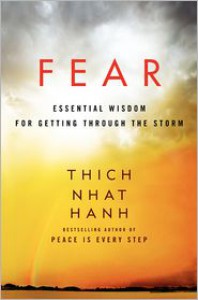 When you pick up Thich Nhat Hanh’s book, ‘Fear’, you immediately get the sense that the words come from a person who is very gentle and whose aim it is to help people overcome the energy draining force known as Fear. Many people spend a great deal of life’s precious resources dwelling on the past or fretting about the future - often which never materializes - instead of living in the present moment, where our true power lies.
When you pick up Thich Nhat Hanh’s book, ‘Fear’, you immediately get the sense that the words come from a person who is very gentle and whose aim it is to help people overcome the energy draining force known as Fear. Many people spend a great deal of life’s precious resources dwelling on the past or fretting about the future - often which never materializes - instead of living in the present moment, where our true power lies.Indeed, staying grounded in the moment is the starting point to overcoming the debilitating effects of fear. When we are mindful of the present moment we can deal with “what is” and not get caught up on the roller coaster of negativity that leaves us powerless. From this place of mindfulness we can observe the fear, embrace it, and then allow it to dissolve. This is a process of “working with” rather than “fighting against.” This is a process of acceptance and then embracing our fear rather than trying to bury it or bully it into submission, “Invite your fear into consciousness, and smile through it; every time you smile through your fear, it will lose some of its strength. If you try to run away from your pain, there is no way out. Only by looking deeply into the nature of your fear can you find the way out.”
Perhaps this sounds a lot easier to do then it truly is in real life, and while this might indeed the case, Thich Nhat Hanh provides many lessons on mindfulness and numerous exercises, especially involving breathing, to help us along the way. As the author states, “When we practice walking meditation, when we breathe mindfully, we generate a powerful energy of mindfulness, which can recognize and embrace our suffering and fear. After doing that for a time, you will see that the fear goes back down to its former place as a seed, and to understand that the next time that it manifests, you’ll be able to do exactly the same thing. Your chronic fear and anxiety will be genuinely reduced.”
In the end, it doesn’t matter what we are fearful of, or how the fear came to exist in the first place, the root of all fear exists in the mind and is reinforced by our beliefs that some external influence is more powerful than our own divine nature. While some degree of fear might be necessary for the survival of our physical being, on a deeper, spiritual level, when we come to realize that true nature extends beyond the mere physical world we see that many, or perhaps all, of our fears are unfounded, “Birth and death, coming and going, are just concepts. When we are in touch with our no-birth, no-death nature, we have no fear.”
By giving us the benefit of his compassionate wisdom, Thich Nhat Hanh is empowering people to overcome the limitations that their fears have imposed upon them. In essence, Thich Nhat Hanh is not giving us keys to our prison cell, he is showing us that the door was never locked to begin with.
How Life Works
 Due to the fact that I enjoy Andrew Matthew’s books so much, and also due to the fact that Andrew’s latest book, “How Life Works” does not come in a hard copy in the North American market, I decided to break with my long-standing resolve of not reading/reviewing E-books. Hey, what good are rules if they aren’t broken… once-in-awhile?
Due to the fact that I enjoy Andrew Matthew’s books so much, and also due to the fact that Andrew’s latest book, “How Life Works” does not come in a hard copy in the North American market, I decided to break with my long-standing resolve of not reading/reviewing E-books. Hey, what good are rules if they aren’t broken… once-in-awhile?And, as often happens when we start to break the rules, it is easier to break subsequent ones; therefore, I am deliberately starting this sentence with ‘and’ when I unabashedly confess that many of Andrew’s cartoons make me laugh my arse off. If I am having a rough day and just need to be uplifted with a good chuckle, I can flip through Andrew’s books and I am bound to have a good belly laugh.
In addition to the humourous cartoons, Andrew also has a very special gift of adding amusing, poignant examples that remind us that self-improvement/empowerment doesn’t have to be serious business. Many books that have been written in this genre take on a very stern tone that can impart the belief that personal development requires struggle; whereas, Andrew’s demeanor is light-hearted and this makes personal growth more enticing. I believe that by taking powerful, life-changing concepts about the nature of our reality, the power of thought, the need to love ourselves, the importance of feeling in the process of manifestation, how obstacles can actually be gifts etc., Andrew is able to share a mental meal that is a lot more palatable than fire and brimstone.
For those of you that are familiar with the smiling Buddha statue, I think the Buddha is smiling because he knew what Andrew Matthews knows - that the secret of life is to enjoy it and, even when things aren’t as we want them to be, we have a choice in how we react. It’s either that, or the Buddha is smiling because he just read one of Andrew’s books. Serious fun.
Key to Yourself: Opening the Door to a Joyful Life from Within
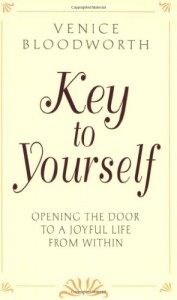 I had never heard of Dr. Bloodworth until having stumbled upon, or perhaps I was led to?, “Key to Yourself” and after recently having read several less than stellar books in this genre, I was very pleasantly surprised with “Key to Yourself.” Although her name may not be as recognized as Ernest Holmes, Joseph Murphy , or Neville Goddard, Dr. Venice J. Bloodworth has produced a very readable and empowering book.
I had never heard of Dr. Bloodworth until having stumbled upon, or perhaps I was led to?, “Key to Yourself” and after recently having read several less than stellar books in this genre, I was very pleasantly surprised with “Key to Yourself.” Although her name may not be as recognized as Ernest Holmes, Joseph Murphy , or Neville Goddard, Dr. Venice J. Bloodworth has produced a very readable and empowering book. From what I can ascertain, “Key to Yourself” was originally published in 1952, toward the end of Venice Bloodworth’s life (she died in 1956), yet it does not contain a great deal of antiquated language or examples; furthermore, the message that she shares is as pertinent today as it was 60+ years ago-it is timeless. In essence, the author advocates that our true power, the power to create and attract into our lives that which we desire, is in the mind – in our thoughts. In Venice’s own words, the process takes place in “The workshop of the mind.”
If humans do create their existence in this “workshop of the mind” then, “The greatest power man has on earth is the power to think” and unfortunately it can also be stated that, “All people think, the tragedy of life is that so few of us think creatively or constructively; so few recognize the fact that thought is a creative force”, and this latter belief is precisely what this book is intended to overcome.
By understanding that, regardless of what we wish to create, the process first commences with a thought, then it develops in our imagination and, as we visualize and focus on an outcome, the results are THEN manifested in the physical world. It is not an ego based system where we alone create everything, rather it is a system where we plant a seed in the conscious mind and as it is nurtured in the subconscious mind it connects with the true source of power, the Universal Mind. “Thought is the connecting link between us and the Universal Mind, and considering this marvelous fact, we arrive at the conclusion that we ourselves are channels through which the Universal Mind pours itself into expression, and that thoughts are causes and conditions are effects.”
Of course, in order to reinforce the connection with the Universal Mind (or whatever you wish to label it as) Venice goes on to advocate the power and necessity of focusing on what we want rather than what currently “is” and she reminds us that, “The visible material things have no originating power within them. Everything we see is a result of an idea; and we must realize this truth before we can rise above and free ourselves from any condition.”
To that end, it is also important that we do not let the naysayers and cynics of the world deter us from what we wish to accomplish, for indeed, “The explorers, prophets and empire builders have all been men who dared to come out of the ruts, think new thoughts, and find new trails. Shake off the old worn-out prejudice, ignorance and superstitions.”
Thinking in this manner, Dr. Bloodworth herself was able to discard her eye glasses as she changed her beliefs about her failing eyesight and she used this “Spiritual Psychology” in her humanitarian work to empower people from all walks of life - from prison inmates to school children. By showing people that we can think ourselves into being happier, more prosperous and healthier, Venice Bloodworth has given people one more key to unlocking the power within.
Wake Up and Live!
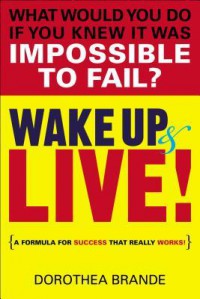 As I mentioned in my reviewer’s description, I generally only post reviews for books that I rate as three stars or higher, and this book, “Wake up and Live!”, by Dorothea Brande, barely made it into the three star designation. This is not to say that the book had absolutely nothing to offer, it’s just that I generally did not find this book to be an enjoyable read, nor did I find a plethora of useful information contained within its pages.
As I mentioned in my reviewer’s description, I generally only post reviews for books that I rate as three stars or higher, and this book, “Wake up and Live!”, by Dorothea Brande, barely made it into the three star designation. This is not to say that the book had absolutely nothing to offer, it’s just that I generally did not find this book to be an enjoyable read, nor did I find a plethora of useful information contained within its pages.The initial four chapters, the first third of the book, deal specifically with failure: why we fail, why we have the will to fail, and the rewards of failure. It is the author’s contention that, “Absurd as it may seem at first consideration that anyone would solemnly enter into even and unconscious conspiracy to fail, it is a matter of observation that there is hardly one person in 100 who does not, in some fashion, deliberately cripple and thwart themselves.” And, while I have no information to prove or disprove this statistic, I do know that Dorothea Brande uses the first 38 pages of “Wake up and Live!” to redundantly advocate her position and this made for tedious reading.
If the reader does make it past those initial 38 pages, they will discover that the author finally commences to share the means by which we can overcome our desire to fail: a change in mindset from an expectation of failure to the complete opposite belief - that it is impossible to fail. In the words of the author, “Act as if it were impossible to fail. That is the talisman, the formula, the command of right-about-face which turns us from failure towards success.”
Although the aforementioned premise is the predominant idea in “Wake up and Live!”, Dorothea Brande does share a few more thoughts that might prove beneficial to the reader, “…it is the sum of small things successfully done that lifts a life out of bondage to the humdrum.”; “At first say as little as possible to others of what you intend to do… Those who are still slaves to dreams, to the Will to Fail, are made uncomfortable by the sight of anyone who is breaking free.” and, “By going over your day in imagination before you begin it,...you can begin acting successfully at any moment.”
For anyone wanting some assistance on how to incorporate some of these concepts into their lives, one of the final chapters is dedicated to exercises referred to as the, “Twelve Disciplines.” While these exercises themselves are not outlandish or extreme, and while they might prove enjoyable/worthwhile for some readers, I would surmise that a number of the activities are already familiar to those people interested in personal development.
In the final analysis, I feel that I did derive some benefit from the words shared by Dorothea Brande in “Wake up and Live!”; however, based on the gift of hindsight, I would say that the time reading this book could have been better spent reading one of the many other books that I have waiting, unopened, on my bookshelf.
Science of Mind (For the millions series)
 I came across “Science of Mind”, by Heather Buckley, at the hospice thrift store and it was only after I started to write this review that I realized how obscure this book seems to be. Many are familiar with, “The Science of Mind” by Ernest Holmes, which I have yet to read, so I cannot make any comparisons between the two books other than to say that Heather Buckley does mention on the back cover that she “…has made this book the most meaningful primer to Science of Mind in print today…” and her 143 page book was published in 1970 while Ernest’s book, of almost 700 pages, was originally published in 1938.
I came across “Science of Mind”, by Heather Buckley, at the hospice thrift store and it was only after I started to write this review that I realized how obscure this book seems to be. Many are familiar with, “The Science of Mind” by Ernest Holmes, which I have yet to read, so I cannot make any comparisons between the two books other than to say that Heather Buckley does mention on the back cover that she “…has made this book the most meaningful primer to Science of Mind in print today…” and her 143 page book was published in 1970 while Ernest’s book, of almost 700 pages, was originally published in 1938.Regardless of how close the information in Ms. Buckley’s book resembles the classic by Ernest Holmes, I found “Science of Mind” easy to follow as well as informative. The main principle behind Science of Mind is that each and every one of us is a creative energy and an eternal part the divine, “Science of Mind teaches that there is one creative power in the universe, the prime unformed creative energy that we call the first principle, divine cause, divine Mind, or God.”
Our connection to this divine mind, whatever label we choose to give it, is through our mind which is, in essence, our thoughts; therefore, what we choose to focus our thoughts on is what we create. “Man is what he thinks, not what he thinks he is, but what his mind dwells on. He may try to hide behind a big ego but what he really thinks, believes in his heart, his inner being, makes him the person he is.”
While this concept may be difficult for many of us to accept, it applies uniformly to everything in nature because everything creates after its own kind, “If you plant the wrong seeds in the earth, the earth still produces according to the nature of what was planted. Why should the life of man be any different? Man plants with his thoughts, his feelings. He reaps what he sows.”
In accordance with our pre-conceived notions, when the idea that 'we reap as we sow' benefits us we tend to believe it; however, when the results are less than, or even contrary to, our desires, we have a tendency to dismiss this idea. The key point is to remember that, “Universal law is. It is neither good nor evil. Man can use it either way.” While this may be frustrating when we observe the negative consequences of our thoughts, it is perhaps more important to remember that this same fact is what empowers us to make a positive changes we wish to see in ourselves and in the world.
Other key ideas that one finds in this book, that are also quite common throughout the New Age/New Thought/Personal-Empowerment genre, are: “Healthy emotions are necessary for a healthy body.”; “To receive love you must give.”; “In reality there is only the Now.”; “Emotion is the spark plug that activates thought, puts it in motion.”; and that, “The only permanent thing in the world is change. Everything is always changing, becoming something else. It is true that a growing plant shows a more perceptible change than a rock, but both are changing.”
While “Science of Mind” is a little more obscure and harder to come by then many of the other books in the genre, in the event that you do come across a copy, I would wholeheartedly suggest obtaining it. While there is no ISBN mentioned in the book, Amazon does have an ASIN for it: B0006C5F6G and the name of the publisher is Sherbourne Press Inc., located in Los Angeles, California.
E-Cubed: Nine More Energy Experiments to Make Joy, Fun, and Finding Miracles Your Full-Time Gig
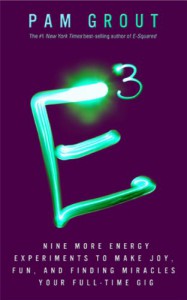 From the very beginning of ‘E-cubed’, literally the first page of the first chapter, the reader gets the distinct impression that this book will be a lot of fun to read and it will certainly turn our “static” views of the world, indeed the very way we see the world, on its head (no, I won’t say specifically what the author, Pam Grout, does - that would spoil the fun).
From the very beginning of ‘E-cubed’, literally the first page of the first chapter, the reader gets the distinct impression that this book will be a lot of fun to read and it will certainly turn our “static” views of the world, indeed the very way we see the world, on its head (no, I won’t say specifically what the author, Pam Grout, does - that would spoil the fun).In ‘E-cubed’ Pam Grout continues from her previous book, ‘E- squared’ with “..nine new experiments and more tips on how to keep the gates of the world’s largess and abundance wide-open..” The experiments are easily understood, simple to implement and won’t cost the reader a thing, other than the loss of old belief systems.
The central idea behind all of the experiments is to demonstrate that our traditional views and beliefs systems can be very limiting and by expanding our awareness into the quantum field, or the field of potentiality (abbreviated as FP in the book), we can make use of latent, universal powers to help create a better reality for ourselves and for the world as a whole.
When we recognize “The fact that your thoughts are energy waves being broadcast out into this giant field of infinite potentiality is something you should be aware of and deploying on a moment-by-moment basis” we can break free from the traditional ‘memes’ in which we have predominantly lived our lives. For those that are not aware, dictionaries define a ‘meme’ as, “An element of a culture or system of behavior that may be considered to be passed from one individual to another by nongenetic means, especially imitation” or “An idea, behavior, style, or usage that spreads from person to person within a culture.” The nine memes that are discussed in E-cubed are then associated with the nine experiments (funny how that worked =;0) and the reader is encouraged to see that our reality can actually change when we overcome our memes.
Regardless of the results we obtain from each individual experiment, and judging from the huge success of the experiments from the first book I expect the positive responses from readers of this book will also be equally amazing, my main take-away from this book is that we don’t have to stay victims of our past or be limited by our social programming. By moving from the conditioned memes to ‘Worldview 2.0’, as Pam refers to it, we start to realize our real potential.
Although readers of other books in this genre will recognize some familiar themes: the power of gratitude, the interconnectedness of all things in the universe, the importance of happiness and, perhaps the most important idea, that thoughts are things and create our reality, I can say that Pam shares these concepts with an unparalleled sense of humour. Indeed, I have yet to find any book in the self-empowerment/self-help/personal awareness genre that was as fun to read as ‘E-cubed.’



